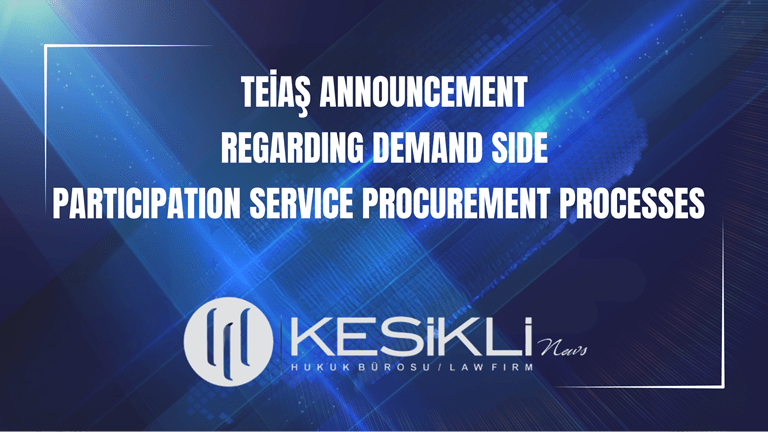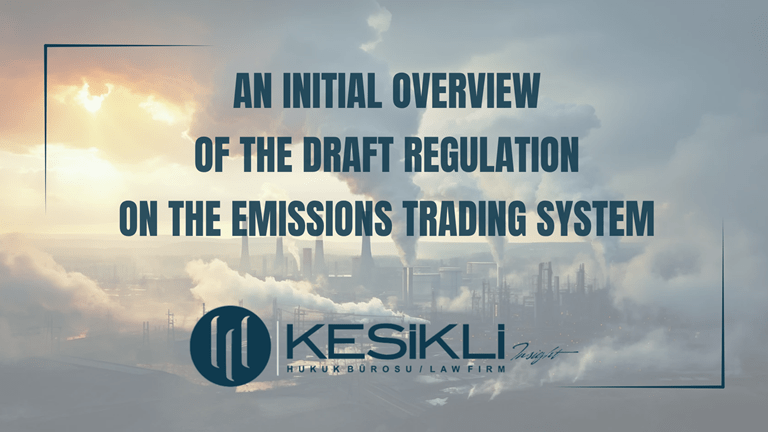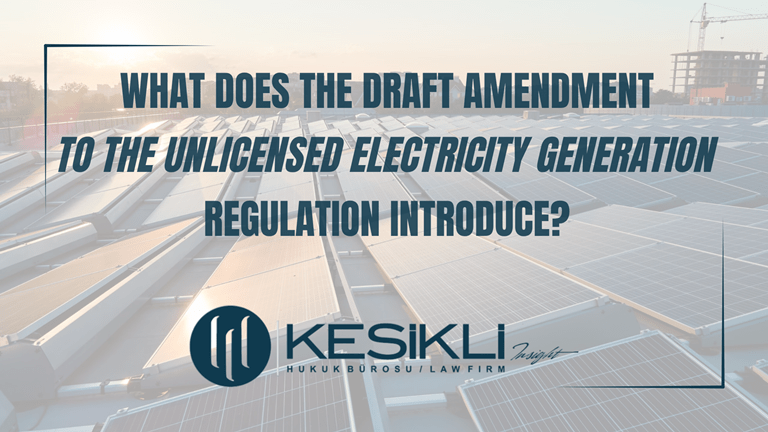Due to the negative effects of the global climate crisis, climate change is becoming an even bigger and more significant problem. One of the main contributors to the increase and impact of these effects is greenhouse gas emissions. The rising population, increased industrialization, and the rapid increase in energy production and consumption have led to a significant rise in greenhouse gas emissions. At this point, the agreements signed under the United Nations Framework Convention on Climate Change and the Paris Agreement, aimed at controlling emissions and reducing or even preventing the negative effects of climate change, bring with them many economic obligations, not only in the climate field. The main goal of these agreements and practices is to reduce carbon emissions by 50% by 2030 and to bring them down to zero by 2050. Since 2015, regulations in Turkey have gained significant momentum under the scope of a "green" economy and "green" practices. The position of the contemplated Emissions Trading System, which is the subject of our article, is crucial in achieving Turkey's climate goals within the context mentioned above.
An Emissions Trading System (“ETS”) is a system that limits or encourages the limitation of greenhouse gas emissions by setting a cap on greenhouse gas emissions and trading allowances accordingly. An allowance, as defined in the draft regulation below, is a greenhouse gas emission permit in the equivalent of one ton of carbon dioxide for a certain period of time, which is transferable and issued in book-entry form.
The European Union ETS (“EU ETS”) is based on a cap and trade system and according to the World Bank Carbon Pricing Dashboard, there are currently 36 active ETS systems in the world. The cap and trade system works on the basis that if the enterprises within the scope of the system exceed the emission caps, they are included in emission trading and receive additional allowances. One allowance is equivalent to one ton of CO2 emissions and these allowances can be allocated free of charge or through an auction process or through inter-business trading. In line with the upper limit and the trade of allowances, a market is created and the prices of allowances are determined.
With the United Nations Framework Convention on Climate Change, which Turkey signed in 2004; the Kyoto Protocol, to which Turkey became a party in 2009; and the Paris Agreement, which Turkey ratified in 2021, it has become obligatory to comply with the principles set out in these conventions internationally, and efforts to establish the ETS system have accelerated in order to achieve the net zero emission target by 2053.
On November 13, 2023, the draft “Regulation on the Operation of Carbon Markets” (“Draft Regulation”) published on The Energy Market Regulatory Authority (“EMRA”) 's website and submitted for public comment regulates the establishment and operation of carbon markets for the allocation and trading of carbon emission allowances in parallel with the EU ETS. The Regulation is based on Article 11 of the Electricity Market Law and the relevant provision of Article 11 of the Electricity Market Law titled “Market operation activity and establishment of Enerji Piyasaları İşletme A.Ş. (”EPİAŞ“)” is as follows:
“(8) Issues regarding other energy market activities and emission trading to be carried out by EPİAŞ outside the scope of its market operating license shall be determined by the Authority in consultation with the Ministry and the Capital Markets Board.”
The pilot phase of the ETS system to be implemented in Turkey is expected to start on October 15, 2024. Following this pilot phase, October 15, 2026 has been set as the date for the transition to the implementation phase. The allocation method to be used in Turkey has not yet been announced.
Established in 2015 in Turkey, the IRD [Monitoring-Reporting-Verification (MRV)] system plays a decisive role for the ETS system. The IRD system aims to monitor, report and verify greenhouse gases. The IRD system divides the facilities in Turkey into three groups and follows the following path in this division:
Group A Facilities : Facilities producing less than 50 ktCO2e emissions Group B Facilities: Facilities producing emissions between 50 and 500 ktCO2e Group C Facilities : Facilities producing emissions higher than 500 ktCO2e
In the pilot phase of the ETS to be established in Turkey, it is stated that Category C Facilities will be included in the pilot scheme first.
The institution responsible for the operation of the carbon market is designated as EPİAŞ. According to the Draft Regulation, carbon markets are divided into two categories, the first of which is;
Primary Carbon Markets: As a carbon market to be organized by EPİAŞ and allocations are distributed among the participants through auction method;
The second one is, Secondary Carbon Markets: It is also defined as the carbon market to be organized by EPİAŞ and where the allocations will be traded.
In order to operate in the above-mentioned markets, facilities within the scope of the ETS are required to register to the Transaction Registry System (“IKS”). The IKS is defined in the Draft Regulation as the electronic data system where the issuance, holding, transfer to another account, cancellation and redemption of allowances are carried out and these transactions are monitored in accounts on the basis of the right holder.
The Emissions Trading Market Management System (“ETPYS”) is a client application system operated by EPİAŞ and made available to participants in order to carry out transactions related to carbon markets.
Primary Carbon Market: In order to participate in the Primary Carbon Market, it is mandatory to register in the IKS system and sign a market participation agreement. At the same time, an application must be made through ETPYS to participate in these markets. Pursuant to Article 11 of the Draft Regulation, allocations will be determined annually and established through a tender. The amount of allocation to be auctioned will be distributed equally among the participants. Auction Programs will be determined by EPİAŞ and EPİAŞ is obliged to fulfill its obligation to submit the auction program until the end of October. Auction programs including the date of the auction, the start and end times of the sessions and the amount of allocation to be offered will be submitted to EMRA and will be announced by the last business day of November at the latest. In the primary carbon market process, participants can only bid for purchases. Participants will provide collateral at a rate determined by EPİAŞ in proportion to their bids. Bids will be ranked from highest to lowest. The allocation amounts offered under the auction program will be matched with the purchase bids, and the final bid price that fully or partially matches the allocation amount will be determined as the Carbon Reference Price. This Carbon Reference Price will be the set price for all participants in the auction. Accordingly, the amount determined over this price will be paid by the participants for each allocation. The allocations offered in the auction will be blocked in EPİAŞ's account in the IKS until they are matched with the bids and established to the participants. If the allocations do not completely match the bids, that auction will be canceled and will be offered again in subsequent auctions according to the new auction schedule.
Secondary Carbon Market: The Secondary Carbon Market is regulated under Articles 18-25 of the Draft Regulation. Pursuant to the Regulations, within the scope of the Secondary Carbon Market, participants registered in the IKS will be able to buy or sell from their accounts on the IKS. Minimum buy or sell bids are set as 1 lot and each 1 lot bid is worth 1000 allowances. 1 allocation corresponds to 1 ton of CO2 and emission value. For the pricing of bids, 50 kurus and multiples of 50 kurus in TL/tCO2 will be used and for the expression of quantities, the number of lots will be used. Sessions will take place between 10:00-15:00 at least one business day a week. Provided that EPİAŞ decides in line with the market needs and notifies the market participants, new sessions may be opened during the week and session opening days/durations may be changed by EPİAŞ. Allocations for which a sell offer is made will be blocked in the account of the participant who submitted the offer, unless the relevant offer is matched, replaced with a new offer or canceled, and cannot be subject to any other transaction via ETPYS during the blocking period.
Allocation Bilateral Agreements : Agreement notifications regarding allocation will be notified to EPİAŞ via ETPYS by both participants who have an account in the IKS. Agreements can be canceled unilaterally during the notification period (between 10:00-15:00 on business days). Allocations subject to bilateral agreement notification will be blocked in the seller's IKS account until the transfer is realized. Blocked allocations cannot be subject to any other transaction through ETPYS and following the notification, the allocation will be transferred at 15:05 on the day of the notification.
Pursuant to Article 27 of the Draft Regulation, participants are required to have an account with central settlement institutions and intermediary banks to be determined by EPİAŞ.
In the Turkish ETS system, the distribution of allocations will be based on historical data in the first phase and will be based on the generation data applied in the EU ETS system in the following period of the implementation.
Since 2018, emission allowances are accepted as financial instruments under MiFID II and are traded in the market accordingly. However, there is no clarification yet on the legal nature of emission allowances for Turkey. It is expected that unclear and unexplained points will be clarified in the Draft Climate Law, which is expected to be brought to the agenda of the Turkish Grand National Assembly in 2024. Although the text marked as Confidential Draft on the website of the Western Mediterranean Exporters' Association has not been confirmed by any statement from the official authorities, Article 8 of the Draft Climate Change Law contains the following regulation on the legal nature of allocations:
Allowances and their legal nature ARTICLE 8- (1) Allowances are capital market instruments in the sense specified in Article 3 of Law No. 6362, which are undifferentiated, transferable, issued in dematerialized form and provide emission permits in the equivalent of one ton of carbon dioxide for a certain period of time.
If the Draft Climate Change Law is finalized and presented to the public as such, emission allowances will be tradable on the stock exchange. However, there is no official regulation or announcement on this issue yet.
The Roadmap for the Establishment of a Greenhouse Gas Emissions Trading System in Turkey prepared by PMR was presented. Within the scope of this report, with regard to market access and trading of the ETS to be established in Turkey, it is stated that allowances will only be traded through a specially allocated central trading platform. During the pilot ETS period, it is stated that the pilot ETS will not be interconnected with other already active emission trading systems.
Although these amendments are in this way, it is expected that the Turkish ETS implementation will not give access to banks and traders in the first phase and especially in the pilot period, although there is no explanation, definition, legal basis for this issue yet.
@Cagla BARUT @Dr. Omer KESIKLI
Let's Get Connected!



